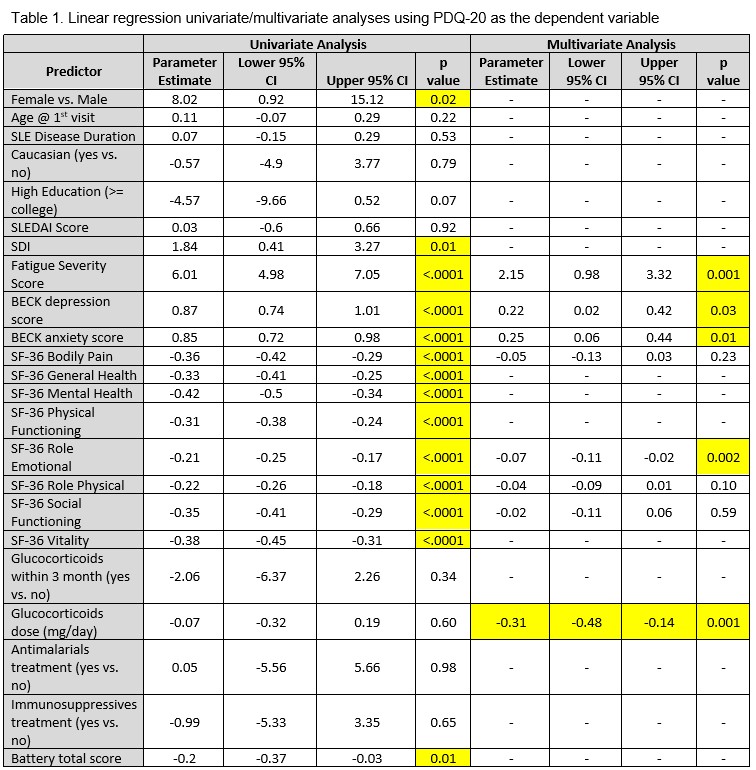Session Information
Date: Sunday, November 7, 2021
Title: SLE – Diagnosis, Manifestations, & Outcomes Poster II: Manifestations (0855–0896)
Session Type: Poster Session B
Session Time: 8:30AM-10:30AM
Background/Purpose: Systemic Lupus Erythematosus (SLE) can lead to a number of neuropsychiatric manifestations including cognitive impairment (CI). Previous meta-analyses have reported the prevalence of CI at 38% (95% confidence interval: 33-43%), with a range of 15-79%. Comprehensive neuropsychological battery (NB) of tests is considered the gold standard when diagnosing CI. We aim to compare a subjective questionnaire, the perceived deficits questionnaire (PDQ-20) to the NB and also to other patient reported outcomes, in an SLE cohort.
Methods: This is a cross-sectional study of consecutive consenting patients, aged 18-65 years, who attended a single center (Jul 2016 – Mar 2019). Each patient completed a comprehensive NB evaluating six cognitive domains including: manual motor speed and dexterity, simple attention and processing, visual spatial construction, verbal fluency, learning and memory (verbal and visuospatial) and executive function. They also completed the 20 item PDQ-20 questionnaire (subjective cognitive function) along with other patient reported outcome questionnaires such as the Beck anxiety score, Beck depression score, fatigue severity score (FSS), Short Form Health Survey (SF-36) domains [Role Physical, Mental Health, Bodily Pain, General Health, Physical Functioning, Emotional, Social Functioning, and Vitality domains].
The variable of main interest was the total score of 19 tests in NB, along with patients’ demographics, lupus disease activity, organ damage, treatment and other PROs. Mean ± std., median (interquartile range) and count (%) were calculated for these variables. Univariate and multivariable linear regressions were performed to evaluate the associated factors with total PDQ-20 scores. Least Absolute Shrinkage and Selection Operator (LASSO) method was used in the variable selection in multivariable model building process. Linear model assumptions were tested by residual density plots and quantile-quantile plots.
Results: Data on 238 patients was analysed; 89.9% were females with an average age and SLE duration at baseline visit of 41.1 ± 12.1 and 14.3 ± 10.0 years, respectively. In the univariate analysis, PDQ-20 was associated with the NB, SDI, fatigue severity score (FSS), BECK anxiety and depression score and all SF-36 domains (Table 1). In the multivariate analysis, PDQ-20 was significantly associated with female gender, SDI, fatigue, BECK depression and anxiety scores, SF-36 Role Emotional domain and glucocorticoid dosage. PDQ-20 was not associated with the NB. There was also no association with age at first visit, SLE disease duration, ethnicity, education level, SLEDAI score, anti-malarial or immunosuppressive treatment with the PDQ-20 score.
Conclusion: Subjective cognitive report by PDQ-20 was associated with the NB in univariate analysis but not multivariate analysis. While PDQ-20 was associated with all SF-36 domains in the univariate analysis, this association was significant only with Role Emotional in the multivariate analysis. There was a clear association of PDQ-20 with other subjective patient reported outcomes (such as fatigue, anxiety and depression, and SF-36 Role Emotional domain).
To cite this abstract in AMA style:
Gupta A, Johnson S, Su J, Knight A, Diaz-Martinez J, Bingham K, Kakvan M, Tartaglia M, Ruttan L, Wither J, Choi M, Fritzler M, Bonilla D, Beaton D, Katz P, Green R, Touma Z. Association of Subjective Cognitive Report Using PDQ-20 to a Neuropsychological Battery in a Cohort of SLE Patients [abstract]. Arthritis Rheumatol. 2021; 73 (suppl 9). https://acrabstracts.org/abstract/association-of-subjective-cognitive-report-using-pdq-20-to-a-neuropsychological-battery-in-a-cohort-of-sle-patients/. Accessed .« Back to ACR Convergence 2021
ACR Meeting Abstracts - https://acrabstracts.org/abstract/association-of-subjective-cognitive-report-using-pdq-20-to-a-neuropsychological-battery-in-a-cohort-of-sle-patients/

